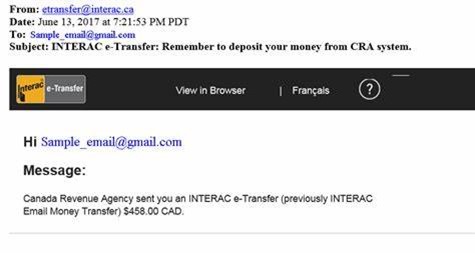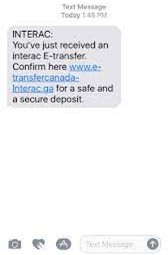3 Common Holiday Scams
'Tis the season for festivities, cheer, and...scams. Unfortunately, with the joyous holiday season, scammers can creep in, looking for unsuspecting targets. Here's everything you need to know about the most common scams we're seeing this year.
Craigslist/Kijiji/Facebook Marketplace Scams
Be aware of scams like these when you’re selling or buying on any of these marketplaces.
A scammer will insist you e-transfer them the funds for something you are purchasing before you pick up the item. They will do this under the expectation that your payment will “hold” the item. They may only ask for a small deposit instead of the full amount. And then they disappear, never to be in touch again.
What you can do
We can’t emphasize this enough: do not send someone money before receiving the item you are paying for. Once you e-transfer funds and they are accepted, it is often extremely difficult, sometimes impossible, to reclaim the funds.
If you are receiving payment from someone and they e-transfer you funds, they may be sending you an e-transfer link that has been fabricated or doctored to be a malicious link. It will look like a legitimate Interac e-Transfer link but will enable the scammer to record your keystrokes so that when you go through the motions of logging in to online banking, the scammer is taking down this information. They are then able to go in and transfer funds out of your account.
What you can do
A simple way to avoid this is to deal in cash only. Otherwise, you want to make sure the links are consistent with Interac e-transfer links. Below is an example of a real Interac e-transfer link versus a scammer’s link.
Tip: look to ensure the email is from: notify@payments.interac.ca
A fake email may look like:

The above image has a few things wrong:
- The "From" email address is not the same as the address Interac uses (see above)
- The subject is inconsistent with the format Interac uses to alert you that you have received funds
- The messaging within the email is inconsistent with the format used in notification emails

- The link does not match standard Interac e-transfer links
- There are spelling and capitalization errors
Fake Product Websites
Let’s say your shoe-crazy cousin is looking for the newest, hottest pair of Jordans (we don’t know shoes) and you find a steal-of-a-deal on a website called hotnewjordans.com. Be wary. If it’s too good to be true, it likely is.
These types of websites won’t usually enable you to make a purchase, but they will try to grab your credit card information for use at another time.
What you can do: check the website's information in the footer (bottom) of the home page. When was it last updated? Are there spelling or grammatical errors? Is the deal/availability too easy, or too good to be true?
Bottom line: only buy from verified sellers.
Charity Scams
‘Tis the season for extra giving, and scammers take full advantage of this. You may receive a phone call, email, or even an online ad for a fake charity requesting money, but it's just lining the scammers’ pockets.
What you can do: Research any charity you plan on giving to and only give to registered, verifiable organizations. A simple Google search will usually give you insight into the likelihood that the charity is legitimate. In Canada, you can view the list of registered charities here.
Vacation Rental Scam
If you and your family are looking to get away for the holidays, beware of scammers promising gorgeous properties or “free” vacations and asking you to transfer them funds instead of booking through a verified website.
What you can do: always use a booking site such as Expedia, VRBO, AirBnB etc to book your accommodations. A legitimate vacation rental will not ask for cheques, bank drafts, or e-transfer.
What to do if you get scammed
Call us and any other banks that may be affected. Letting your bank know will put them into action right away to help protect your funds. In many cases, it may also be worth filing a police report, in the event that a scammer could be caught and prevent them from harming other people.
You can also alert Interac in the event of e-transfer fraud: phishing@interac.ca Go easy on yourself. Getting scammed can be embarrassing but we are not here to shame you! We are here to help and scammers are getting more and more proficient at fooling the public.
Be proactive. We suggest Googling common fraud trends a few times a year. You can even sign up for newsletters that will send you regular emails with information about the newest scams. Just remember, before signing up for any newsletters, make sure the website is current, verified, and has a good reputation.
Happy Holidays and happy scam-free shopping!

 Search
Search






 Learn
Learn

